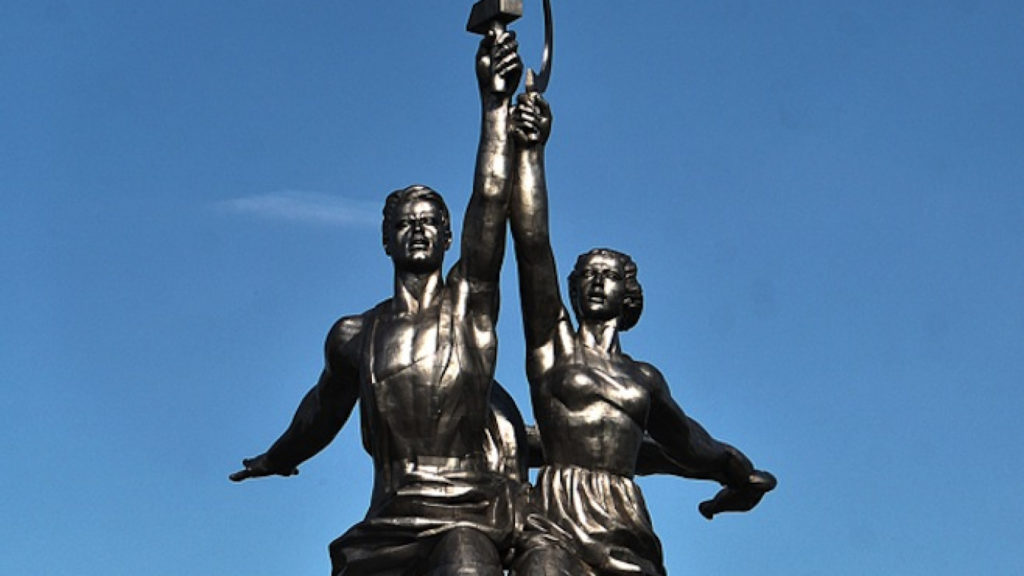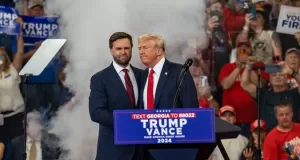Research Unit for Political Economy, Mumbai
It is very unusual for Narendra Modi to praise his political rivals, but on April 27, during his video conference with chief ministers of different states, he lavished praise on the Congress chief minister of Rajasthan. According to news reports, he said:
“Every state has some party in power, which realises that it has a chance to take the country forward…. Hamein reform bhi karna hai. Agar reform karne ki disha mein rajya initiative leta hai,aap dekhiye yeh sankat ko hum bohot bade avsar main palat sakte hain. Main Ashok Gehlotji ko badhai dunga. Unhone kai initiative liye. Unhone labour ke liye samay seema ki bhi badhotri ki hai. Theek hai alochana thodi hue hogi, lekin Rajasthan ne disha dikhayi hai (We have to carry out reforms too. If a state takes an initiative for reform, we can turn this crisis into a big opportunity. I want to congratulate Ashok Gehlot. He has taken several initiatives. He has increased the time limit for working hours as well. No doubt there must have been some criticism of this, but Rajasthan has shown the way).”[1]
The Prime Minister was apparently referring to the Rajasthan government’s decision to increase working time in factories from 8 hours to 12 hours; he urged other states to follow suit. Indeed other states have already joined in this drive to extend working hours: Gujarat, Madhya Pradesh, Haryana, Himachal Pradesh, and Punjab have amended the Factories Act of 1948 through executive orders to effect this change. In several of these states, the overtime hours will not be paid at higher rates.
Yesterday was perhaps the darkest May Day in the history of the Indian working class. Never has the voice of India’s working class been so suppressed. Millions of workers are locked down, their meagre funds exhausted, and they hardly left with rations for the following day. At a handful of places – at Surat, Hyderabad, Mumbai – they have gathered in protest, demanding merely to be allowed to return to their villages; these protests are quickly dispersed by the police.
Of course, as the Supreme Court has directed the media to report the official version, it should be mentioned that the lockdown and all associated actions are being undertaken by the Government in the interests of public health and welfare. According to the Government’s own affidavit in the Supreme Court, 1.4 million migrant labourers are housed in ‘relief camps’, and 13.4 million are receiving food from food camps. When a petitioner asked the court that the workers be paid their earned wages, the Court in its wisdom asked why they needed money, when they were being supplied meals.
Open season on workers’ rights
This crisis, we are told, is an opportunity for ‘reform’, a word whose meaning has been turned into its opposite since the rise of neoliberalism in the 1980s.
It was amid the horrors of the Industrial Revolution that the working class first asserted itself. May Day marks the historic struggle of workers of the world to limit the hours of work – commemorating the occasion when 134 years ago the workers of Chicago struck work for an eight-hour day. And it is 130 years since the workers in the world’s major capitalist countries jointly struck work in what a New York newspaper called a “Parade of Jubilant Workingmen in All the Trade Centers of the Civilized World”. The eight-hour day was not a favour granted by factory-owners or governments, but a product of the workers’ struggle. As Marx wrote in Capital, the legislations limiting the working day
“were not at all the products of Parliamentary fancy…. Their formulation, official recognition, and proclamation by the State, were the result of a long struggle of classes…. The creation of a normal working day is, therefore, the product of a protracted civil war… between the capitalist class and the working-class.”
Somesh Jha noted in yesterday’s Business Standard that India under British rule adopted a 60-hour week in 1922; the Factories Act of 1934 reduced it to 54 hours; this was raised back to 60 by the British rulers during World War II – still 12 hours short of what six state governments have just legalised. For nearly two centuries, the word ‘reform’ meant the expansion of liberty and the betterment of the lot of labourers. Now reform means throwing labourers back a century and a half.
Of course, the present extension of the working day is being presented as merely a temporary measure, for the next three months, or for however long the Covid 19 crisis lasts. The official rationale is that reducing the number of workers would allow ‘social distancing’ norms.[2] But the changes are not limited to the length of the working day; it is now open season on workers’ rights. Ruling circles are in fact discussing, more and more openly, the scope for turning this crisis into an opportunity to do many things that would otherwise have been difficult.
Their excitement is palpable. A labour ministry official baldly told the Telegraph that labour reforms were being pushed through to bolster India’s competitiveness in attracting foreign investment: “This is an opportune time to bring in reforms to attract FDI. These reforms will result in economic growth, whose benefits will trickle down to the workers and everybody else”.
Arvind Panagariya, former vice-chairman of the Niti Aayog, the Government’s policy-making body, conveys a similar sense of urgency: “It will be a pity to let the crisis go to waste. The current crisis will only last till a vaccine becomes available…. Multinationals will be seeking greater diversification of their activities in the wake of Corona. India must not miss this opportunity…. The crisis also gives the government the opportunity to introduce reforms in areas of land and labour markets that are harder in ‘peace’ time, he said, adding that the Land Acquisition Act must be reformed. Likewise, greater flexibility is necessary in labour markets.”
Animal spirits
For reviving the economy, these economists have nothing to suggest but the separation of more toilers from the means of production, and depressing the price of their labour power. To quote again Marx’s chapter on “The Working Day”:
“…in its blind unrestrainable passion, its were-wolf hunger for surplus labour, capital oversteps not only the moral, but even the merely physical maximum bounds of the working day. It usurps the time for growth, development, and healthy maintenance of the body. Capital cares nothing for the length of life of labour-power. All that concerns it is simply and solely the maximum of labour-power, that can be rendered fluent in a working day. It attains this end by shortening the extent of the labourer’s life, as a greedy farmer snatches increased produce from the soil by robbing it of its fertility.”
The rationale of these labour ‘reforms’ is that economic recovery depends on arousing the ‘animal spirits’ of capitalists to invest, for it is they who create wealth. In his last August 15 address, the Prime Minister told the nation to honour and empower them:
“In our country, certain wrong beliefs have come into existence. We have to come out of those mindset. Those who create wealth for the country, those who contribute in the nation’s wealth creation are all serving the country. We should not doubt our wealth creators. The need of the hour is to recognise and encourage the wealth creators of our nation. They should receive more honour. If wealth is not created, wealth cannot be distributed. Further, if wealth is not distributed we cannot uplift the poor sector of our society. Such is the importance of wealth creation for our country which we need to facilitate further. Those who are making efforts to create wealth, according to me they themselves are an asset to the nation and must be empowered.”
The animal spirits of “wealth creators” are to be aroused by stepping up the processes of appropriation and expropriation of the vast majority.
In fact, however, easing the forcible acquisition of peasant land, slashing workers’ wages, and making a bonfire of labour rights have not even the remotest connection with tackling either Covid-19 or the economic crisis. If anything, these actions would further destroy livelihoods and depress general demand, and in this way would prolong the unprecedented economic depression that we have now entered.
Joining in this spirit of ‘reform’, the Parliamentary Standing Committee for Labour has proposed that companies with up to 300 workers be allowed to fire workers or shut units without the prior approval of the Government. (Till now the cut-off for this was 100 workers.) The Committee also recommended that employers need not even pay salaries during “natural calamities” – presumably including the present pandemic. Several state governments have cited the pandemic to cut their employees’ salaries or defer payment, and the Centre has frozen dearness allowance and deducted ‘contributions’ from its employees (without obtaining their consent) for the newly set up PM-CARES fund. A number of major corporations – such as Vistara, OYO, Bajaj, Indigo, Go Air, Reliance, Panasonic India, Future Group, and Air India – have effectively cut wages. In all likelihood the pay cuts will stay in place beyond the Covid 19 crisis, on the ground that the economic depression will not have lifted – a situation that could persist for years, since the world is now in what even the IMF Chief calls the worst economic downturn since the Great Depression of the 1930s.
The truth is that the Indian economy was already in a depression before Covid-19, with an outright decline in corporate investment. The Government’s own survey data showed unemployment at 40-year highs in 2018, and other data show sharp deterioration since then. The Government suppressed its own consumption expenditure survey because it revealed an unprecedented decline in per capita expenditure.
The atmosphere of crisis and panic with the entry of Covid-19, however, has provided a useful cover for a class offensive by the Indian ruling classes. An intelligent spokesman of their interests, T.N. Ninan, editor (and part-owner) of the Business Standard, considers the destruction of the remnants of organised labour a silver lining in the dark cloud of the pandemic:
“Time was when such pay-cuts were a complete no-no in Socialist (sic) India…. This protected world of assured jobs, wages and pensions (spelling a modest if secure existence) related to just a sixth of the total workforce. The rest were in the informal sector, where it was a free-for-all and you were lucky to even get a proper letter of employment…. [T]here were signs that the dichotomy was becoming intolerable; Covid-19 has simply hastened the denouement…. the proles who are the ‘C’ category workers [in the public sector] are paid twice or three times what they would get in the labour market. It couldn’t last…. Such irrationality has to unravel when confronted by the reality of an economy in turmoil… If Covid-19 helps restore some rationality in these and other areas, its legacy may not be entirely destructive.”
The vice-president of the Reliance-funded Observer Research Foundation celebrates the Covid-19 ‘opportunity’ in much less inhibited, near-rapturous, terms:
“Crises precede reforms. Crises are a precursor of ending festering problems. Crises lift us from legislative-executive-administrative lethargy. Crises clear the ways for higher equilibriums. And crises bind nations….
Covid-19 is the perfect storm for reforms.
Economically, Covid-19 is a 1991 moment.
Geopolitically, Covid-19 is a Balakot moment.
Constitutionally, Covid-19 is abrogation of Article 370 moment….
The usual reforms of land, labour and infrastructure are behind us. Overnight, this troika that was seen to be ‘aspirational’ now needs to be seen as a starting point. Three to six months from now, India and the world should be talking about these reforms in past tense. The circle of logic around these three key reforms is simple. India needs jobs. Jobs are created by private capital. Private capital needs a business environment that is entrepreneur-friendly…
The time for dragging committees, commissions and task forces is over. We are in a 21st century Kurukshetra and all negotiations are behind us. Action is the only way forward. And as the head of government, the conch of declaring this war on the past and ushering in a new and reformed India is in Prime Minister Narendra Modi’s hands.
We must turn Independent India’s biggest challenge, Covid-19, into India’s biggest opportunity.”
This is an embarrasingly bald-faced manifesto, but it reflects quite accurately the process under way, and the character of the present times.
The times are dark indeed. The class offensive underway against the vast majority of working people appears to meet no opposition. The classes which are ground down take time to gather their forces and assert themselves. However, it is a mistake to look only at the surface of things. Below the surface, there is great unrest.
Truths borne out
The circumstances of this May Day, however bleak, have underlined the truth of certain of Marx’s assertions.
(i) There could be no more striking demonstration than this lockdown of the simple fact that all of society runs on the labour of toiling people, in the fields, mines, factories, kilns, trains, buses, marketplaces, hospitals, sewers, and so many other sites. Without the labour of the workers, the owners of capital, the ‘wealth creators’, are unable to create a loaf of bread or a pin. And now, in order to ‘revive’ the economy, they have nothing more to suggest than that they step up the exploitation of workers.
(ii) Nor could there be a starker demonstration of the fact that the counterpart of the process of accumulation of capital at one pole is the accumulation of misery at the other. Two sizeable surveys of migrant workers in the present crisis found that they earned starvation wages, and indeed were now at the brink of starvation, with money or rations to sustain them for at most a few days.[3] This is at the end of having worked for months in cities, creating wealth appropriated by others.
(iii) Marx and Engels ended their manifesto with the words, “Proletarians of all countries, unite!” In recent times, the working people of India have been told that the main threat they face is from the proletarians of other countries, illegal immigrants – and more broadly, working people of other faiths, other castes. These ‘others’ are to be placed in detention camps, even treated like “termites”. The majority of workers are encouraged to feel superior to these ‘other’ workers. But, 150 years ago, Marx explained that such false consciousness would in fact enslave the ‘superior’ workers too.[4]
The present crisis has borne out the truth of Marx’s analysis. It has most dramatically shown that the real, operative divisions in society are on class lines. Now workers of all communities are being locked down, regarded as illegal persons, rounded up at borders, beaten with batons, abused, and detained in camps.
Marx and Engels told the workers they “have a world to win.” That world will be fashioned in the course of their struggles.
Notes
[1] Indian Express, April 28, 2020. Emphasis added.
[2] This is difficult to understand, since the number of workers at a given time in any workplace would be the same regardless of whether they worked 8 hours or 12 hours.
[3] A survey of 11,159 migrant workers found that 50 per cent had rations left for less than 1 day, and 72 percent of them for 2 days. 78 per cent had less than Rs 300 left with them. The average daily wage prior to lockdown was Rs 402 (median daily wage was Rs 400), and about 70 percent of them are left with less than Rs 200 (less than half their daily wages) for the remaining lockdown period. (Stranded Workers Action Network, “21 Days and Counting: COVID-19 Lockdown, Migrant Workers, and the Inadequacy of Welfare Measures in India”, https://www.thehindu.com.) In another survey covering 3,196 workers, about 55 per cent reported earning Rs 200-Rs 400 on days they worked, while 39 per cent earned Rs 400-Rs 600. 66 per cent said they would not be able to manage their expenses beyond a week, and 22 per cent said they could manage for a month. 42.3 per cent stated that they did not have any rations left for the day, let alone for the next few days; a majority of the workers did not have sufficient rations for a week. (“Voices of the Invisible Citizens”, Jan Sahas, New Delhi, https://ruralindiaonline.org.)
[4] Two pithy statements of his in this context: “Labour in a white skin cannot emancipate itself where it is branded in a black skin”, and “A nation that enslaves another forges its own chains”. https://rupe-india.org/70/capital.html
(Research Unit for Political Economy is a trust based in Mumbai that brings out material seeking to explain day-to-day issues of Indian economic life in simple terms and link them with the nature of the country’s political economy.)
***
[Below is an extract from another article on the same theme, giving details of the attack on labour laws being carried out by several states, taking advantage of the pandemic – Editor.]
Taking Away Labour Rights One at a Time: How the Covid Crisis is Manifesting into a Nightmare for India’s Poorest
Tanaya Thakur, May 10, 2020
Recently, the Uttar Pradesh government passed the Uttar Pradesh Temporary Exemption from Certain Labour Laws Ordinance, 2020. This ordinance is said to exempt businesses from the purview of most labour law provisions for the next three years, with the exception of laws related to bonded labour, deployment of women and children and timely payment of salaries. Thus, laws on labour welfare, industrial dispute, factories act, among various others shall stand suspended for three years in order to salvage the projected economic losses that the pandemic induced lockdown shall cause. Many of them being Central Acts might require the consent of the Central government for the Ordinance to come into force. But, considering that both the Centre and Uttar Pradesh are governed by a BJP- led majority; it should not be difficult to secure the requisite permissions.
Relaxation in laws such as the Factories Act, come not only with negative consequences on labour but also raise environmental concerns. Any massive industrial that happens due to lax labour regulations could potentially have a long term impact on the environment – such as the Bhopal gas disaster. Factories Act deals with provision on health – cleanliness, disposal of waste, overcrowding, drinking water; safety – employment of young person, pressure plants, protection against dangerous fumes, gases, explosive or inflammable dust, precautions in case of fire, safety of building and machinery; provisions relating to hazardous process – appraisal committee, disclosure of information, responsibility of the occupier, limits on exposure to toxic substances, safety management; welfare; working hours; etc. With increasing numbers of industrial disasters that we have seen in the past few days such as the Vishakhapatanam gas tragedy, boiler explosion in NLC thermal plant in Tamil Nadu’s Neyveli, toxic fume release from Madhavram warehouse in Chennai – can we really say that labour laws are dispensable, even for a single day?
It should be noted that the Factories Act under Section 5 permits state governments to relax the applicability of the Act during situations of public emergency. However, this relaxation is permitted only for a period of three months at a time; unlike the three year time frame that the UP government proposes. Also, the way public emergency has been defined under the act, as a grave emergency whereby the security of India or of any part of the territory thereof is threatened, whether by war or external aggression or internal disturbance – the Covid pandemic does not meet the bill.
Uttar Pradesh is not the only state to come up with such ordinance on labour law relaxation. The Madhya Pradesh government has also exempted employers from some obligations under various labour laws, like Madhya Pradesh Industrial Relations Act, the Madhya Pradesh Labour Welfare Fund Act, the Madhya Pradesh Industrial Employment (Standing Orders) Act, Industrial Disputes Act, and Contract Labour Act for 1000 days. New factories have been exempted from inspection by the Labour Department under the Factories Act, and can instead have third party inspections. Madhya Pradesh, Rajasthan, Haryana, Himachal Pradesh and Punjab have also extended the working hours in manufacturing units to 12 hours from existing 8 hours.
These steps are said to be taken in light of India’s economic slowdown and are being argued to possibly have a positive impact on the ease of doing business and attracting more investors. India’s ranking in the World Bank’s ease of doing business report has been increasing. In 2019, it ranked at 77th, which is a massive jump from the 142nd place in 2014 – when the Modi-led BJP government first came to power. Various legal reforms such as the Goods and Services Tax and the Insolvency and Bankruptcy Code have been credited as the reasons behind this jump. It is in public domain that the government has been striving to further increase its doing business ranking and making the country more investor friendly. The government has also previously been accused of relaxing labour norms and environment policies in wake of the Prime Minister’s ambitious plan of achieving a $5 trillion economy by 2024. Thus, the exemption of labour policies appear another step in the chain of events that had been put in motion long back by the BJP government.
These ordinances not only violate the domestic legal principles, but also the international legal standards. The Universal Declaration of Human Rights, the ICESCR, International Labour Oraganization principles – all stand violated by these moves. The International Trade Union Confederation, the world’s largest trade union federation ranks India among the worst countries for working class. With impending suspension of labour regulations, this ranking is only going to go down.
(Tanaya Thakur is Junior Research Fellow (Law) at IIT Kharagpur. She holds masters in international law from South Asian University, New Delhi.)




